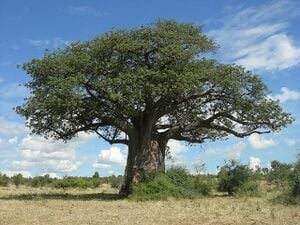
Botswana, officially the Republic of Botswana, is a landlocked country in Southern Africa. Botswana is topographically flat, with approximately 70 per cent of its territory part of the Kalahari Desert. It is bordered by South Africa to the south and southeast, Namibia to the west and north, Zambia to the north and Zimbabwe to the northeast. With a population of slightly over 2.4 million people and a land area similar to France, Botswana is one of the most sparsely populated countries in the world. It is essentially the nation-state of the Tswana people, who constitute nearly 80 per cent of the population.
The Tswana ethnic group are descended mainly from Bantu-speaking peoples who migrated into southern Africa, including modern Botswana, in several waves before AD 600. In 1885, the British colonised the area and declared a protectorate named Bechuanaland. As part of the Decolonisation of Africa, Bechuanaland became an independent Commonwealth republic under its current name on 30 September 1966. Since then, it has been a parliamentary republic with a consistent record of uninterrupted democratic elections, although the Botswana Democratic Party has been the only ruling party from independence until 2024. As of 2024, Botswana is the third least corrupt country in Africa, according to the Corruption Perceptions Index published by Transparency International.
The economy is dominated by mining and tourism. Botswana has a GDP (purchasing power parity) per capita of about $20,158 as of 2024. Botswana is the world's biggest diamond-producing country. Its relatively high gross national income per capita (by some estimates the fourth-largest in Africa) gives the country a relatively high standard of living and the second-highest Human Development Index of continental Sub-Saharan Africa (after South Africa). Botswana is a member of the Southern African Customs Union, the Southern African Development Community, the Commonwealth of Nations, and the United Nations.
Food activism[edit | edit source]
Solar cooking resources in Botswana]
News and comment[edit | edit source]
 We created the first AI-powered solar electricity backup system for houses in sub-Saharan Africa, The Conversation (Jan 25, 2022)
We created the first AI-powered solar electricity backup system for houses in sub-Saharan Africa, The Conversation (Jan 25, 2022)
2009
2009 SEED Award winners: South Africa, Namibia and Botswana: "Biocultural protocols - community approaches to Access and Benefit Sharing". Civil society organizations have mobilized efforts to develop bio-cultural protocols with different local indigenous communities which will help to provide a model whereby local communities can share the benefits if local resources and expertise are developed for market purposes.[1] May 12
Environmental issues in Botswana[edit | edit source]
Botswana faces two major environmental problems: drought and desertification.
The United Nations Development Programme claims that poverty is a major problem behind the overexploitation of resources, including land, in Botswana. To help change this the UNDP joined in with a project started in the southern community of Struizendam in Botswana. The purpose of the project is to draw from "indigenous knowledge and traditional land management systems". The leaders of this movement are supposed to be the people in the community, to draw them in, in turn increasing their possibilities to earn an income and thus decreasing poverty. The UNDP also stated that the government has to effectively implement policies to allow people to manage their own local resources and are giving the government information to help with policy development. W
External links[edit | edit source]
Botswana W